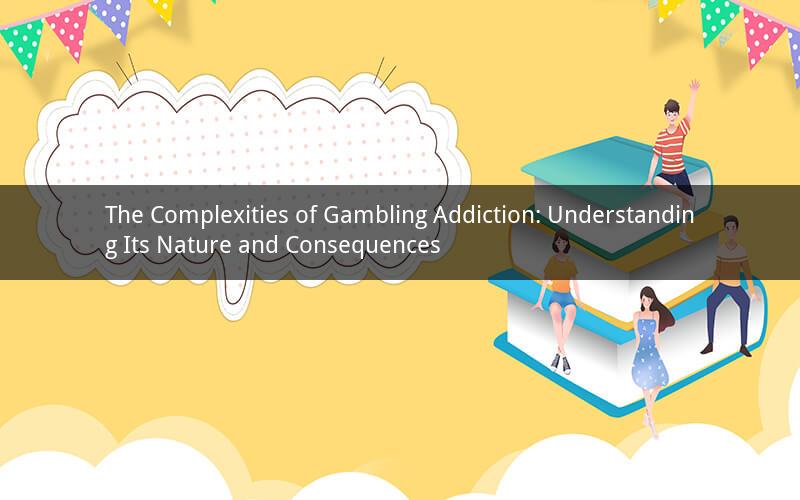
Introduction:
Gambling has been a popular form of entertainment for centuries, offering excitement and the potential for financial gain. However, with its widespread availability and the advent of online gambling platforms, the issue of gambling addiction has become a significant concern. This article explores the complexities of gambling addiction, its nature, consequences, and potential solutions.
1. What is Gambling Addiction?
Gambling addiction, also known as compulsive gambling or problem gambling, is a behavioral disorder characterized by an inability to control the urge to gamble, despite negative consequences. It is a complex condition influenced by various factors, including psychological, environmental, and genetic factors.
2. Signs and Symptoms of Gambling Addiction
Identifying gambling addiction can be challenging due to its subtle nature. However, certain signs and symptoms can indicate a potential problem:
a. Preoccupation with gambling: Constantly thinking about gambling, planning for future gambling sessions, or reliving past gambling experiences.
b. Increased gambling frequency: Spending more time and money on gambling activities, often at the expense of other responsibilities and relationships.
c. Chasing losses: Trying to recover lost money by gambling more, often leading to even greater losses.
d. Lying or hiding gambling activities: Hiding gambling debts, lying about the amount of time spent gambling, or concealing gambling-related activities from loved ones.
e. Risking relationships and career: Neglecting personal and professional responsibilities to accommodate gambling activities.
3. Causes of Gambling Addiction
Several factors contribute to the development of gambling addiction:
a. Genetic predisposition: Research suggests that genetics play a role in gambling addiction, with a higher prevalence among certain families.
b. Psychological factors: Individuals with low self-esteem, depression, anxiety, or other mental health conditions may be more susceptible to gambling addiction.
c. Environmental factors: Easy access to gambling opportunities, exposure to gambling-related media, and the normalization of gambling behavior can contribute to addiction.
d. Social influences: Peer pressure, family dynamics, and the desire to impress others can also increase the risk of developing a gambling addiction.
4. Consequences of Gambling Addiction
Gambling addiction can have severe consequences, affecting various aspects of an individual's life:
a. Financial consequences: Accumulating debt, losing savings, and potential bankruptcy due to excessive gambling.
b. Emotional consequences: Feelings of guilt, shame, anxiety, and depression, as well as strained relationships with loved ones.
c. Legal consequences: Facing legal repercussions, such as arrest or imprisonment, due to illegal gambling activities or fraudulent behavior to support gambling habits.
d. Health consequences: Physical health issues, such as sleep disturbances, increased stress levels, and heart problems, as well as mental health issues, including substance abuse and other addictive behaviors.
5. Treatment and Support for Gambling Addiction
Treating gambling addiction requires a comprehensive approach, involving various treatment modalities:
a. Cognitive-behavioral therapy (CBT): CBT helps individuals identify and change negative thought patterns and behaviors associated with gambling addiction.
b. Support groups: Joining support groups, such as Gamblers Anonymous, can provide individuals with a sense of community and shared experiences.
c. Medication: In some cases, medication may be prescribed to help manage underlying mental health conditions contributing to gambling addiction.
d. Financial counseling: Addressing the financial consequences of gambling addiction, including debt management and budgeting strategies.
Frequently Asked Questions:
1. Can gambling addiction be cured?
Gambling addiction is a chronic condition, but it can be effectively managed with appropriate treatment and support. While a complete cure may not always be possible, individuals can learn to control their gambling behavior and reduce its negative impact on their lives.
2. How long does it take to recover from gambling addiction?
The duration of recovery from gambling addiction varies from person to person. Some individuals may experience rapid progress, while others may require ongoing treatment and support for an extended period.
3. Can family members of a gambling addict be affected?
Yes, family members of gambling addicts can be significantly affected. They may experience emotional distress, financial strain, and strained relationships. Seeking support for themselves is crucial for their well-being.
4. Are there any effective self-help strategies for overcoming gambling addiction?
Yes, individuals can adopt self-help strategies, such as setting limits on gambling activities, seeking support from friends and family, and engaging in alternative hobbies to distract from the urge to gamble.
5. Can gambling addiction lead to other forms of addiction?
Yes, gambling addiction can be associated with other addictive behaviors, such as substance abuse or compulsive eating. Addressing the underlying issues contributing to addiction is essential for a comprehensive recovery process.